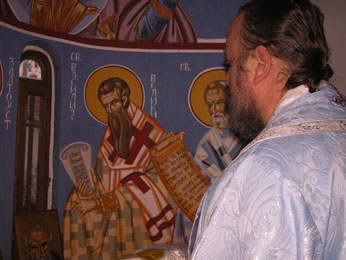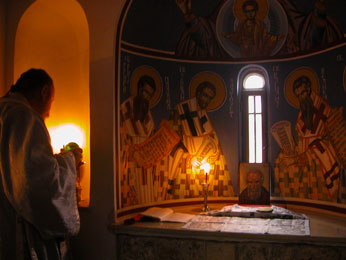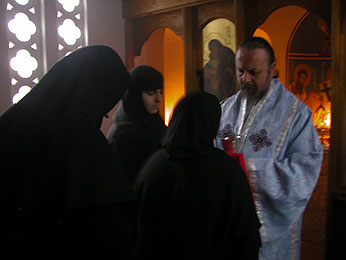Circumcision, in Heart and Ears ( 14.01.2008 )
On the feast of the Circumcision of Our Lord and God and Savior Jesus Christ and Saint Basil the Great, Archbishop of Caesarea, Metropolitan of Strumica Nahum celebrated Divine Liturgy in the monastery of Saint Maximus the Confessor and Saint Gregory Palamas in Star Dojran. 



Then the shepherds returned, glorifying and praising God for all the things that they had heard and seen, as it was told them. And when eight days were completed for the circumcision of the Child, His name was called Jesus, the name given by the angel before He was conceived in the womb. And the Child grew and became strong in spirit, filled with wisdom; and the grace of God was upon Him (Luke 2:20-21, 40).
After the reading of the Gospel, the Bishop said:
In order for us to easier understand the event of the circumcision of the Godman Christ, we should first recall two things. Firstly, Christ’s words: “Do not think that I came to destroy the Law or the Prophets. I did not come to destroy but to fulfill. For assuredly, I say to you, till heaven and earth pass away, one jot or one title will by no means pass from the law till all is fulfilled (Matt. 5:17-18). And secondly, all that the Godman has done in the Divine Dispensation, He has done for us and our salvation not for Himself.
Reading today’s Gospel passage, I recalled the prayer we say at the end of the Divine Liturgy before the holy Chalice at the altar table: Christ our God, You are the fulfillment of the Law and the Prophets; You have fulfilled the entire saving Dispensation of the Father, do fill with joy and delight our hearts, always, now and ever and unto ages of ages. Amen.
If we carefully observe this prayer, we will recognize in it the historical periods of the Old and the New Testaments as well as the endless period of the Heavenly Kingdom, which already is and is still not. In the language of Orthodox theology, these periods are also called: ‘Shadow’, ‘Icon’, and ‘Truth’. As regards our personal (and communal) spiritual life, these periods correspond with the three stages of spiritual development: purification of the heart from the passions, illumination of the mind, and deification of the whole person, both body and soul. Exactly because of the reference to these three levels, I would like us to discuss about today’s Gospel reading.
If we want to see at which level of spiritual development we are—that is, whether we are at the level of purification or illumination i.e. whether we live in line with the Old or the New Testament—we should only check which criterions we fulfill. Certainly, here there are many shades in the behavior i.e. whether or not we struggle and what is our first reaction like after the suffered injury to our vanity and high self-esteem. Here is what the Old Testament says: If anyone injures his neighbor, whatever he has done must be done to him: fracture for fracture, eye for eye, tooth for tooth. As he has injured the other, so he is to be injured. Whoever kills a man must be put to death (Lev. 24:19-21). And here is what the New Testament says: “But I tell you not to resist an evil person. But whoever slaps you on your right cheek, turn the other to him also” (Matt. 5:39). “You have heard that it was said, ‘You shall love your neighbor and hate your enemy.’ But I say to you, love your enemies, bless those who curse you, do good to those who hate you, and pray for those who spitefully use you and persecute you” (Matt. 5:43-44). I think that with but a little sincerity and self-criticism we will easily get the answer.
To him who does not want to (it is not that he cannot) be self-critical, apply the words of the Holy Proto-martyr Stephen: “You stiff-necked and uncircumcised in heart and ears! You always resist the Holy Spirit; as your fathers did, so do you” (Acts 7:51). Explained further by the Holy Apostle Paul, these words mean that: he is not a Jew who is one outwardly, nor is circumcision that which is outward in the flesh; but he is a Jew who is one inwardly; and circumcision is that of the heart, in the Spirit, not in the letter; whose praise is not from men but from God (Rom. 2:28-29).
Certainly, there are even clearer criterions about that at which level we are, which you know, and it is that at the first stage of spiritual development prayer can be only oral and of the intellect, while at the second stage it can be also prayer of the mind and heart. At the third stage prayer can be only unceasing mind-and-heart prayer. This time that is not the central theme, though.
It is good that we all recall and never loose out of sight that, as regards usual spiritual development, jumping to a subsequent level is not possible without passing through and fulfilling the preceding one. “For I say to you, that unless your righteousness exceeds the righteousness of the scribes and Pharisees, you will by no means enter the kingdom of heaven” (Matt. 5:20). These words mean nothing but this: if we do not purify our heart from the passions sufficiently, we will never receive God’s gift of ‘opening of the heart’ and our mind will never prayerfully enter the narrow gate of the heart that leads to the Kingdom of Heaven.
(as recorded by the Sisters)